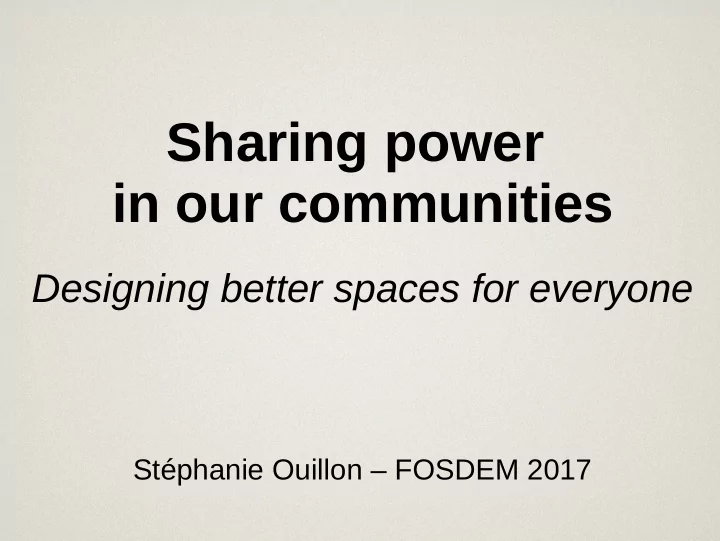

Sharing power in our communities Designing better spaces for everyone Stéphanie Ouillon – FOSDEM 2017
« Diversity » and « Inclusion »
Reflection of our western society
It's about power.
Larger structures of power (social, institutional) shape individual power relationships.
=> Individual and collective empowerment
What it means to be on the better side:
I am legitimate to occupy space.
My opinion is considered as (more) legitimate.
I can make the decisions for myself and for others.
People have fewer negative prejudices against me.
Changing the rules in our communities.
By dismantling power inequalities and norms we learned.
Becoming more aware of how we interact with each other.
Change how we: Debate Decide Collaborate Make
Goals: ● Neutralizing hierarchies ● Deciding together ● Empowering
Steps for organizing 1. Observe/Listen 4. Test 2. Design 3. Implement
1. Observing and Listening
Who talks, decides, is there? Who is silent, listens, is absent?
Who is paid, legitimate, enthusiastic? Who is put aside, angry?
« people who are marked are generally viewed as “having something” that unmarked people do not have. That “something” can therefore be subjected to remarks, questions, debate, praise or critique; » Julia Serano, How Double Standards work
« the unmarked person escapes such critical analysis by virtue of the fact that they are not seen as having that “something.” » Julia Serano, How Double Standards work
Who do you mark?
« The marked group is unfairly singled out and plagued by assumptions and stereotypes that the unmarked group does not face. » Julia Serano, How Double Standards work
Double standards ● Universal assumptions ● Hierarchies ● Stereotypes ● Attribution Julia Serano, Excluded
Forms of invalidation ● Mentally incompetent ● Sexualized ● Immoral ● Sick, unealthy ● Anomalous ● Fake, inauthentic Julia Serano, Excluded
● Who includes who? ● According to which rules? ● Who needs to adapt? ● Do we change how we make decisions?
Meritocracy and do-ocracy
Repeating power patterns and inequalities because some things are not being explicited and discussed
Questions ● Who has access to ressources to contribute? ● Who has the power and abilities to « do »? ● Who makes decisions and according to which values?
Risk of homogenization e.g: mentoring and accepting work of people « like us »
« Do-ocracy is more efficient » ● What/who are we winning and losing? ● Why do we need to go fast? => Balance to find
Toolbox for detecting patterns ● Listening skills ● Double standards ● Invalidation ● Organisation mapping
2. Designing
Following the example of permaculture permacultureprinciples.com
Toolbox for designing ● General principles ● Concrete methods ● Collective creativity
Everything changes. There is no unique model in time and space
Design Principles ● Pay attention to what/who is silent or absent. ● Expect and respect emotions.
Design Principles ● Rotate. ● Design to allow learning skills and evolving.
Design Principles ● The ideal system doesn't exist, but you can get closer to something fair.
Learn and adapt methods.
Some methods ● Decision made with collective consensus ● Sortition ● Rotation of roles ● Games
Some methods ● Communication: gender inclusive, questionning common insults, etc. ● Accessibility
3. Implementing
A craft needs: ● Good will ● Skills to be developped Robert Senett, Together
● Listening well ● Behaving tactfully ● Finding points of agreement and managing disagreement ● Avoiding frustration in difficult conversation
Get informed of social realities and inequalities ● Knowledge in context and history ● Empathy
Sharing power as a craft
Toolbox for improving our « sharing power » craft ● Good will ● Dialogic skills ● Knowledge in power patterns ● Knowledge of yourself!
Toolbox for improving our « sharing power » craft ● Know when to speak up and when to stay silent ● Bolster voices of others
Toolbox for improving our « sharing power » craft ● Learn what's different between what's anecdotal and systemic ● When you mess up: acknowledge, apologize, stop.
4. Test
We are not Chuck Norris.
Steps for organizing 1. Observe/Listen 4. Test 2. Design 3. Implement
Conclusion
« A world made of multiple worlds » Jérôme Baschet, Adieux au capitalisme, Autonomie, société du bien vivre et multiplicité des mondes
Commons + Social equality = alternative political spaces
To go further (English) Online resources: ● Feminist Perspectives on Power, Standford Encyclopedia of Philosophy https://plato.stanford.edu/entries/feminist-power/ ● How Double Standards Work (understanding the unmarked/marked distinction), Julia Serano http://juliaserano.blogspot.fr/2015/01/how-double-standards-work-understandi ng.html ● Intersectionality : The Double Bind of Race and Gender, Kimberley Crenshaw (interview) http://www.americanbar.org/content/dam/aba/publishing/perspectives_mag azine/women_perspectives_Spring2004CrenshawPSP.authcheckdam.pdf ● Autonomous government I & II, Freedom according to the Zapatistas http://mexicosolidarity.org/sites/default/files/EZLN-%20Autonomous%20Gove rnment%20I.pdf ● How Can You Make a ‘Real’ Difference? Try These 9 Acts of Everyday Radical Activism, Everyday feminism http://everydayfeminism.com/2017/01/everyday-radical-activism/
To go further (English) Books: ● Circles of Power: Shifting Dynamics in a Lesbian- Centered Community, La Verne Gagehabib and Barbara Summerhawk ● Together, Robert Senett ● Excluded, Julia Serano
To go further (Spanish) Online resources: ● Gobierno autónomo I & II, La Libertad según l@s Zapatist@s http://www.schoolsforchiapas.org/library/cuadernos-de-t exto-de-la-primer-escuelita-zapatista-gobierno-autonomo -1/ ● Micropolítica de los grupos, Para una ecología de las prácticas colectivas, Vercauteren, Crabbé, Müller http://micropolitiques.collectifs.net/IMG/pdf/micropolitic d52a.pdf
To go further (French) Sites : ● Les attributs du pouvoir et leur confiscation aux femmes, Antisexisme.net https://antisexisme.net/2012/04/09/le-genre-et-lespace/ ● Micropolitique des groupes, pour une écologie des pratiques collectives, Vercauteren, Crabbé, Müller http://micropolitiques.collectifs.net/ ● Constellations, trajectoires révolutionnaires du jeune 21e siècle, collectif Mauvaise Troupe http://constellations.boum.org/ Livres : ● Adieux au capitalisme, Autonomie, société du bien vivre et multiplicité des mondes, Jérôme Baschet (livre)
Recommend
More recommend